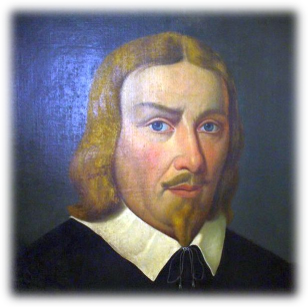Saint of the Week: Jakob Böhme
5/14/2025

Jakob Böhme
1575 – 1624
Mystic
Jakob Böhme was a German philosopher, Christian mystic, and Lutheran theologian. Considered an original thinker by contemporaries within the Lutheran tradition, his first book, Aurora, caused a great scandal. At 14, he was apprenticed to become a shoemaker. Essentially a polymath, he regularly prayed, read the Bible and studied works by visionaries such as Georg Weigel, Paracelsus, and Caspar Schwenckfeld. By 1599, he was master of his craft with his own shop in Görlitz. That same year he married Katharina Kuntzschmann, with whom he had four sons and two daughters. Since his youth, Böhme had regular mystical experiences that culminated in 1600 as he focused on the exquisite beauty of a beam of sunlight reflected in a pewter dish. To him, that vision revealed the spiritual structure of the world and the relationships between God and man, good and evil. Initially, he did not share this experiences openly, preferring to focus on his work and raising a family. But in 1610, Böhme experienced another vision by which he claimed to have gained a deeper understanding of the unity of the cosmos and to have received a special vocation from God. In 1612, he began writing his first book, The rising of Dawn, which a friend dubbed “Aurora.” Böhme originally wrote it for himself but a copy of the unfinished work was loaned to Karl von Ender, a nobleman who then circulated it to friends, In 1619, Böhme wrote On the Three Principles of Divine Being, followed by several short works which were included in his first formally published book, The Way to Christ, on 1 January 1624. Local clergy were outraged and banished him to Dresden. There, he found a more accepting lay and clerical audience. He was also honored by the Dresden intelligentsia. The chief concern with Böhme's writing was the nature of sin, evil and redemption. Consistent with Lutheran theology, he preached that humanity had fallen from a state of divine grace to a state of sin and suffering; God's goal was to restore the world to a state of grace. Where his theology was at odds with mainline faithful was his insistence that God exists without time or space, regenerating himself through eternity. As for the Trinity, he saw God, the Father as fire, who gives birth to his son, whom Böhme calls light. The Holy Spirit is the living principle--divine life. Evil is "perversion of making spirit nature's servant,” a distortion of initial Divine order. Eventually, he did return home but soon fell terminally ill and died on 17 November 1624.



